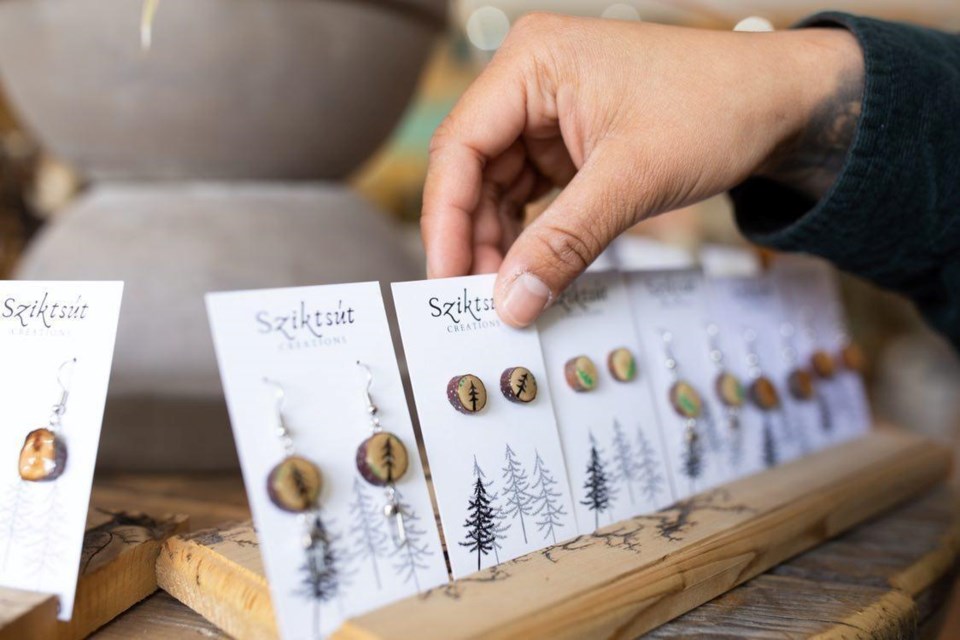Victoria Saddleman, the only Indigenous vendor at the Squamish Farmers' Market, started her business, Sziktsút Creations (pronounced Zik-shoot), during the COVID-19 pandemic. She found inspiration for her art from tree branches left to dry near her home.
“They were just left there to dry up, and I thought it would be amazing to use them somehow,” Saddleman said. With her father's help, she began experimenting with wood burning and later moved on to painting. “It was a learning process—lots of breaking things and trying again.”
Since its start in 2003, the Squamish Farmers' Market has grown a lot, attracting more than 145,000 visitors each year. The market hosts over 60 vendors each week and more than 100 vendors throughout the year, according to a new study.
Saddleman remembers how welcoming the other vendors were on her first day.
“It felt like stepping into something new and unfamiliar. But everyone there was very welcoming, and I quickly got comfortable,” she said.
Market manager Megan Verge said Saddleman’s presence adds to the market.
“Victoria Saddleman’s presence at our market is incredibly valuable,” Verge said in an email.
“She brings a unique perspective and a deep cultural heritage that enriches the diversity of our offerings. Her products are not just items for sale; they carry stories, traditions, and a connection to the land that resonates with many of our visitors. Having Victoria as a vendor helps us celebrate and acknowledge the rich Indigenous history of this area, and it is something we are very proud to support.”
Verge also mentioned that finding Indigenous vendors for the market has been difficult.
“Applications open twice a year, and we select our vendors based on location, with Sea to Sky vendors given priority. While we usually get a good variety of vendors, Indigenous vendors are harder to find,” she said.
“A couple of years ago, we tried to attract Indigenous vendors to the market, and a board member was assigned to help with this.”
The market has been shifting toward more food-focused vendors, which adds to the challenges.
“We’ve found that most Indigenous vendors are in the craft sector, and as the market changes, we’re moving away from crafts and focusing more on food,” Verge said.
“This shift, along with needing to book six months in advance, can be hard for Indigenous vendors who might be more used to one-off markets where you can book a month or two ahead.”
Saddleman pointed out that the financial and time commitments for the market can be tough. “It is a huge commitment—you are there for six hours selling, plus an hour or two for setup, and then another hour after the market. For me, the Squamish Market easily turns into a 10-hour day, and the next day I am at the Whistler Farmers’ Market,” she said.
To help with these challenges, the Squamish Farmers' Market offers extra support for Indigenous vendors. “We are always ready to help prospective vendors with the application process,” Verge said.
“If financial constraints are an issue, our board would love to meet with prospective vendors and see what we can do to make their participation possible.”
Saddleman suggested that having reserved spaces or discounts for Indigenous vendors who want to try out the market would be helpful. “Almost like a community table,” she said. “Markets aren't for everyone, and it would allow people to test it without committing to a full year.”
Verge hopes to see more Indigenous vendors in the future. “We would love to have more food-based Indigenous vendors at the market,” Verge said.
“Offering discounts or reserved spaces would allow them to try it out without committing to a full year.”
The market has a significant impact on the local economy, generating an estimated $7.54 million annually through direct sales and increased revenue for nearby businesses on market days according to the study.
For Saddleman, creating art is more than just a craft—it is a process that reflects the patience and energy she brings to her work. “I was always taught as an artist to be patient because the energy you carry within your body comes out in your artwork,” she said.
Saddleman’s journey at the Squamish Farmers' Market is deeply rooted in her cultural heritage.
“My art is me; that is how I describe it. It is about taking a piece of the land and carrying it with you wherever you go,” she said.
The Squamish Farmers' Market is on Saturdays from 10 a.m. to 2 p.m.
Bhagyashree Chatterjee is The Squamish Chief’s Indigenous affairs reporter. This reporting beat is made possible by the Local Journalism Initiative.




